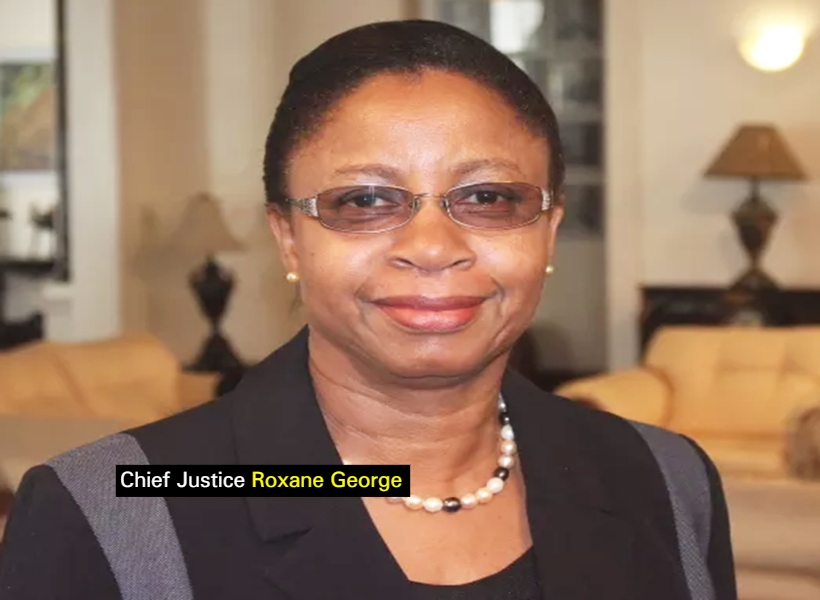Chief Justice Roxane George has instructed representatives of the Guyana Elections Commission (GECOM) and the People’s Progressive Party Civic (PPP/C), to return to court on Monday to provide her with an update on the “progress” made with regards to the votes verification exercise for Region 4. This was in light of these same representatives including GECOM’s Chairperson, Claudette Singh, Region Four Returning Officer, Clairmont Mingo, and the party’s members, who were present in court, being unable to meet common ground after they were instructed by Justice George to resolve their issues and get on with the process.
This morning these representatives attended court in Contempt of Court proceedings brought against the two aforementioned GEOCM representatives as well as its Chief Elections Officer, Keith Lowenfield. While Lowenfield is yet to be served by court marshals with a copy of those proceedings, they have already been received by Singh and Mingo. Right now, both sides are at loggerhead over the methodology being used by Mingo to tabulate the votes for that particular electoral district.
PPP’s lawyer Anil Nandlall is insisting that the process is not being done in keeping with Sections 84 (1) and 86 (1) of the Representation of the People Act. Nandlall is claiming that the Returning Officer has been, and continues to use a pre-prepared spreadsheet to carry out the process. Furthermore, Nandlall also claims that his party’s duly elected candidates were barred from viewing the process which resumed yesterday, but was later in the day suspended. He said that it was only when the process resumed this morning, that some of the candidates were allowed to observe what was going on.
GECOM’s Senior Counsel Neil Boston rubbished Nandlall’s claim. Boston said that his clients were not only complying with the process laid out in the relevant electoral laws, but also with the consequential orders handed down by the Chief Justice on Wednesday. According to Boston, the contents of the Statements of Poll (SoP) obtained from the Presiding Officers across the polling stations in Region Four are being put on a screen for everyone to see; he said that it is PPP/C’s representatives who are raising disagreement.
Boston told the court, “They want this thing to be continued in a way they feel it should be continued with.” However, Nandlall rose from the bar table in objection. He pointed out, “This is not what is being done.” The party’s lawyer submitted that its candidates are being deliberately prevented from viewing the documents, which are the spreadsheet and SoPs, being used by the Returning Officer to tabulate those votes.
He said this after the Chief Justice inquired of Boston to detail the verification process that has been adapted. Justice George then asked, “In the process is the SoPs being put up on a screen.” Nandlall responded in the negative and Justice George then sought to question why this was not being done. Referencing parts of her judgment, and of course the laws, the Chief Justice said, “Persons are meant to see; they may disagree but that is their problem. The law allows for disagreement in a particular way.”
“They want to, and are required to see the document [being used to tabulate the votes],” Justice George repeated. The designations of the persons the Judge was referring to are outlined under Section 86 (1) of the Representation of the People Act, outlines the persons who must be present at the counting of the votes.
They include: the returning officer and such other election officers as he may appoint to assist him in the counting; the Minister, members of the Commission and members of any team of observers appointed by the minister; duly appointed candidates; counting agents; such other persons as, in the opinion of the Returning Officer, have good reason to be present.
The Chief Justice, however, reasoned that if a political party has 10 or 40 duly elected candidates, it does not mean that all of them have to be present during the process. She said that the discretion of how many persons can be present lies solely with the Returning Officer and no one else. A charge of Criminal Contempt requires a trial in which persons would have to testify.
Should one be found guilty of this offence they are to be punished pursuant to Section 6 of the Contempt of Court Act.
It reads: Any person natural or person artificial found to be in contempt of Court is liable in the case of –
(a) an individual, to a fine not exceeding
two hundred and fifty thousand dollars ($250,000) or imprisonment for a term not exceeding three months.
(b) a company or other association, to a fine not exceeding seven hundred and fifty thousand dollars ($750,000).
Nandlall has alleged that GECOM’s Chairperson, its Chief Elections Officer and Commissioners are aiding and abetting Mingo to flout the lawful process. He said the Contempt of Court proceedings is not intended to have anyone imprisoned, but rather have them comply with the orders of the Chief Justice. Even as the Returning Officer sat in court this morning, the vote verification process was well underway and is currently continuing, Nandlall told the court today.













